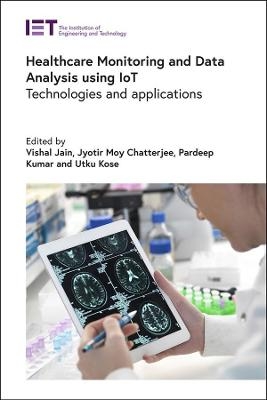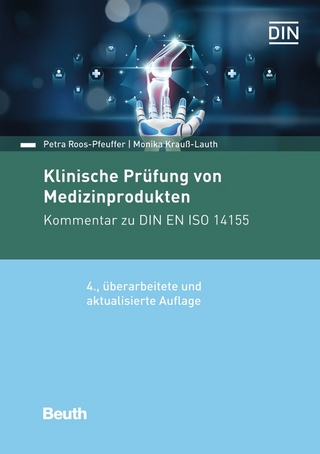
Healthcare Monitoring and Data Analysis using IoT
Institution of Engineering and Technology (Verlag)
978-1-83953-437-9 (ISBN)
- Titel nicht im Sortiment
- Artikel merken
IoT-enabled healthcare technologies can be used for remote health monitoring, rehabilitation assessment and assisted ambient living. Healthcare analytics can be applied to the data gathered from these different areas to improve healthcare outcomes by providing clinicians with real-world, real-time data so they can more easily support and advise their patients.
The book explores the application of AI systems to analyse patient data and guide interventions. IoT-based monitoring systems and their security challenges are also discussed.
The book is designed to be a reference for healthcare informatics researchers, developers, practitioners, and people who are interested in the personalised healthcare sector. The book will be a valuable reference tool for those who identify and develop methodologies, frameworks, tools, and applications for working with medical big data and researchers in computer engineering, healthcare electronics, device design and related fields.
Vishal Jain is an associate professor at the Department of Computer Science and Engineering, Sharda University, India. He was awarded Young Active Member Award (2012-13) from the Computer Society of India, Best Faculty Award (2017), and Best Researcher Award (2019) from BVICAM, New Delhi. He has published over 70 peer-reviewed papers and 10 books. His research areas include information retrieval, semantic web, ontology engineering, data mining, ad hoc networks, and sensor networks. Jyotir Moy Chatterjee is an assistant professor in the Information Technology Department at Lord Buddha Education Foundation (LBEF), Nepal. He has been a member of the organizing committee of various international conferences (IEEE, Springer, Elsevier) and serves as a reviewer for numerous international journals. His research interests include the Internet of Things, machine learning, and deep learning. He has published 22 research papers, 3 international conference papers, 28 books, and 16 chapters. Pardeep Kumar is a professor and the head of the Software Engineering Department, QUEST University, Nawabshah, Pakistan. He is also the director for the Office of Research, Innovation and Commercialization (ORIC). His research interests include wireless communication, wireless sensor networks, distributed and embedded systems and IoT technologies. Dr. Kumar has been an author/editor of 4 books, several book chapters, and more than 50 research publications. Utku Kose is an associate professor at the Department of Computer Engineering of Süleyman Demirel University, Turkey. He has published more than 200 journal papers, conference presentations, keynote speeches and book chapters. His research interests include artificial intelligence, machine ethics, artificial intelligence safety, optimization, chaos theory, distance education, e-learning, computer education, and computer science.
Chapter 1: COVID-19 pandemic analysis using application of AI
Chapter 2: M-health: a revolution due to technology in healthcare sector
Chapter 3: Analysis of Big Data in electroencephalography (EEG)
Chapter 4: An analytical study of COVID-19 outbreak
Chapter 5: IoT-based smart healthcare monitoring system
Chapter 6: Development of a secured IoMT device with prioritized medical information for tracking and monitoring COVID patients in rural areas
Chapter 7: An IoT-based system for a volumetric estimation of human brain morphological features from magnetic resonance images
Chapter 8: Healthcare monitoring through IoT: security challenges and privacy issues
Chapter 9: E-health natural language processing
Chapter 10: Blockchain of things for healthcare asset management
Chapter 11: Artificial intelligence: practical primer for clinical research in cardiovascular disease
Chapter 12: Deep data analysis for COVID-19 outbreak
Chapter 13: Healthcare system using deep learning
Chapter 14: Intelligent classification of ECG signals using machine learning techniques
Chapter 15: A survey and taxonomy on mutual interference mitigation techniques in wireless body area networks
Chapter 16: Predicting COVID cases using machine learning, android, and firebase cloud storage
Chapter 17: Technological advancement with artificial intelligence in healthcare
Chapter 18: Changing dynamics on the Internet of Medical Things: challenges and opportunities
Chapter 19: Internet of Drones (IOD) in medical transport application
Chapter 20: Blockchain-based Internet of Things (IoT) for healthcare systems: COVID-19 perspective
Chapter 21: Artificial intelligence-based diseases detection and diagnosis in healthcare
| Erscheinungsdatum | 20.04.2022 |
|---|---|
| Reihe/Serie | Healthcare Technologies |
| Verlagsort | Stevenage |
| Sprache | englisch |
| Maße | 156 x 234 mm |
| Themenwelt | Medizin / Pharmazie ► Physiotherapie / Ergotherapie ► Orthopädie |
| Technik ► Medizintechnik | |
| ISBN-10 | 1-83953-437-0 / 1839534370 |
| ISBN-13 | 978-1-83953-437-9 / 9781839534379 |
| Zustand | Neuware |
| Informationen gemäß Produktsicherheitsverordnung (GPSR) | |
| Haben Sie eine Frage zum Produkt? |
aus dem Bereich


